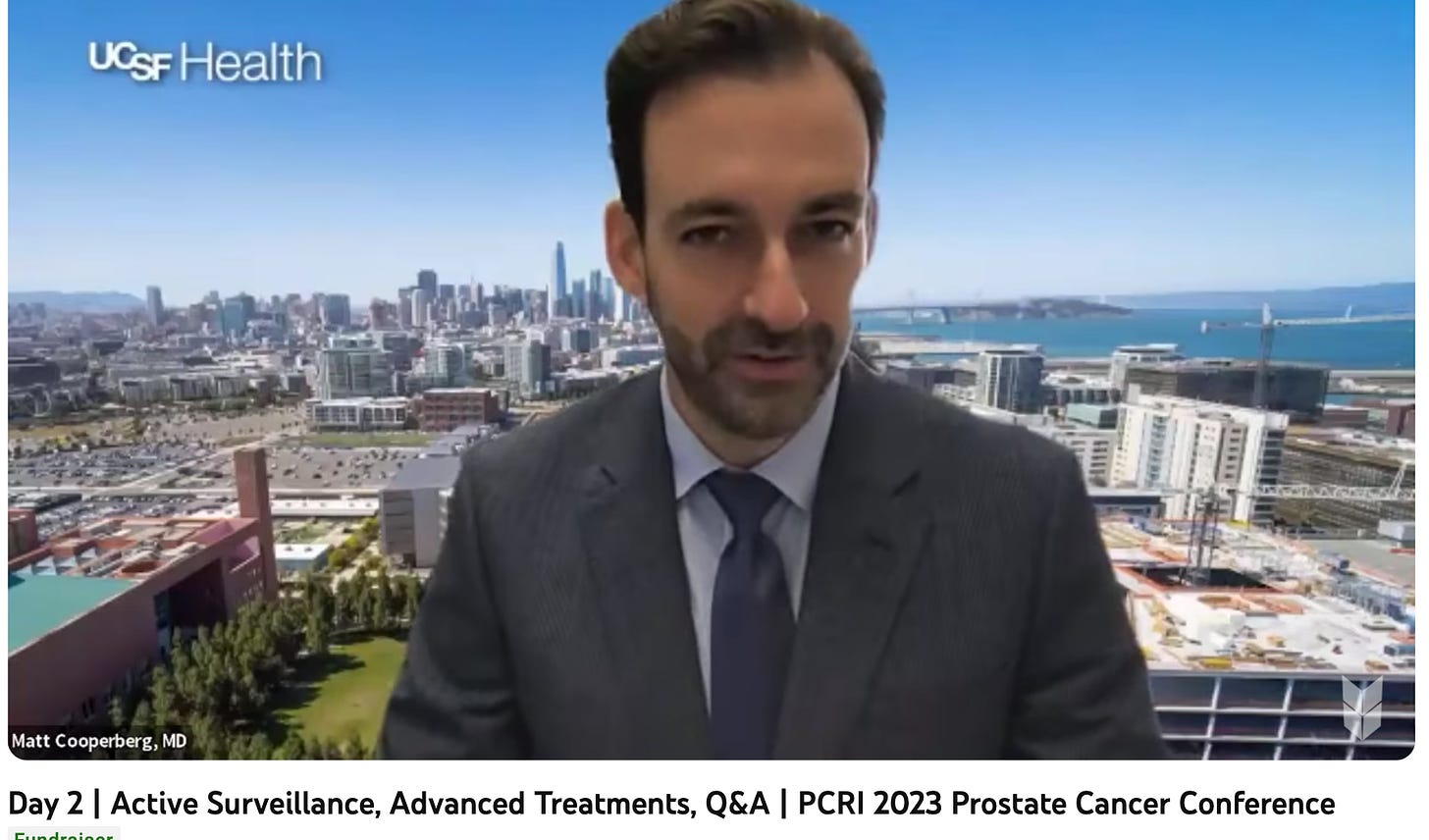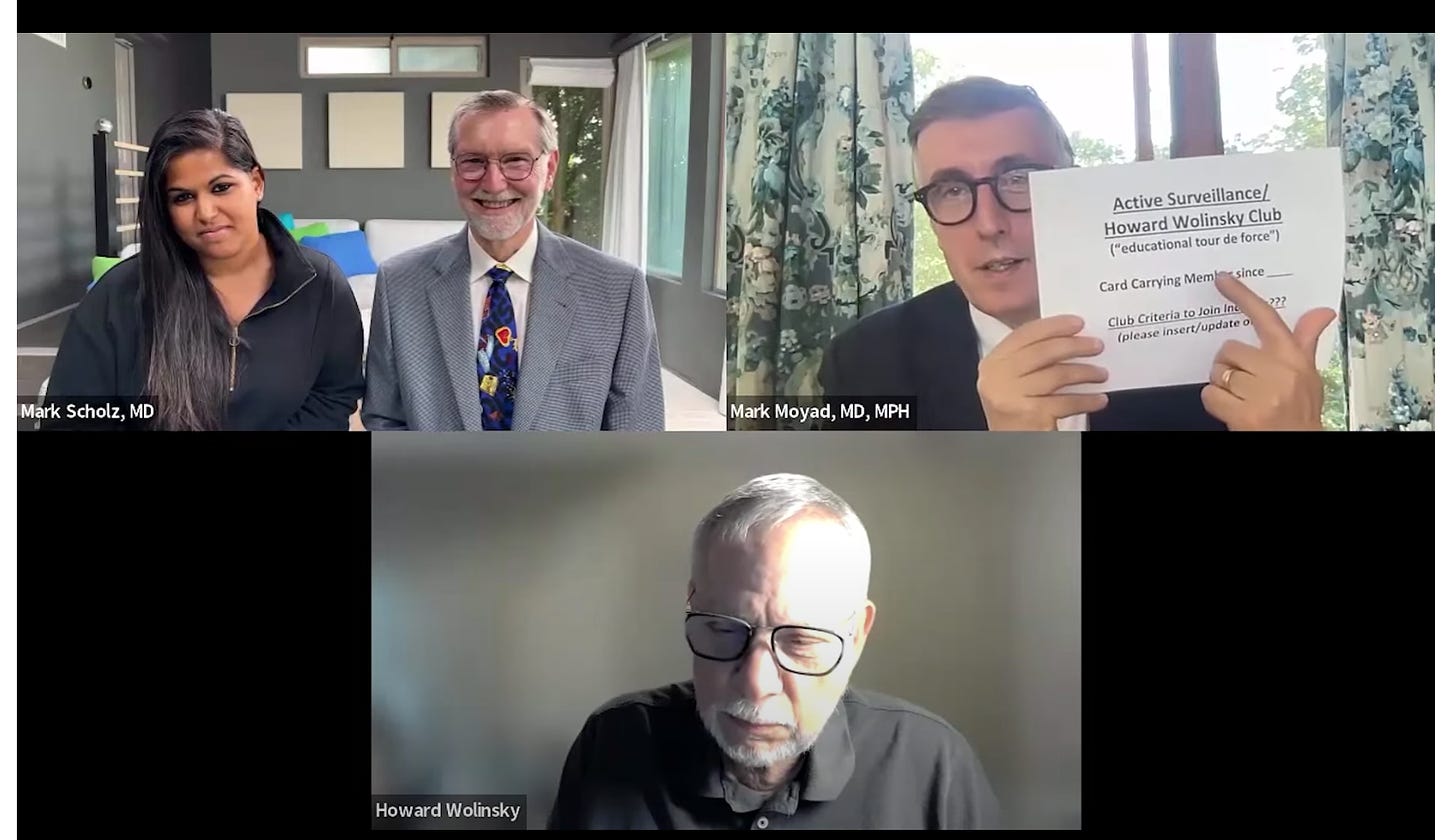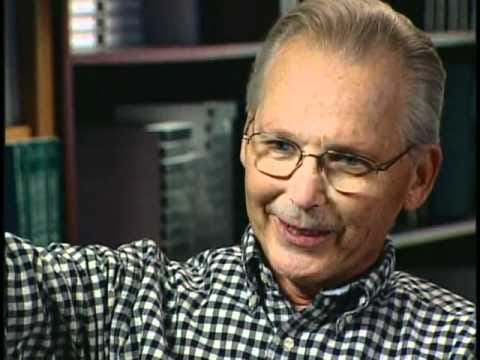By Howard Wolinsky
Matthew Cooperberg, MD, MPH, of the University of California, San Francisco, is one of the champions for Active Surveillance (AS) and patients with lower-risk prostate cancer.
During the annual meeting of the Prostate Cancer Research Institute’s virtual annual meeting Sept. 24, he, with moderator Mark Moyad, MD, MPH, of the University of Michigan (Go Blue!), presented one of the best programs I’ve seen on AS. And, believe me when I say, I’ve seen quite a few AS programs over the past 13 years.
(Dr. Matt Cooperberg)
To view this video, go to PCRI.org. Click on the second-day program. Start at the 9:30 minutes mark to hear this 90-minute AS tour de force: https://pcri.org/ Phil Segal, of Prostate Cancer Support Canada’s AS virtual group, has prepared a handy /index of the progam: http://bit.ly/46hjFRZ
I will present some highlights in this and future articles.
Moyad asks: Should Grade Group 1 (Gleason 6) be called a cancer?
Cooperberg says no and cites the work of Scott Eggener, MD, of the University of Chicago, et al.
He said: “We should not call this a cancer, okay? I'm in a small but growing minority of folks that are saying this. … The tide is kind of shifting on this. And they did it by age [of practitioners], right? So the older generation, especially in pathology, are very committed to this is cancer. It looks like cancer. It's cancer.
“But the folks who are kind of coming through now have -- are a little bit more open to the idea. And my vantage point on this is that you take something that looks like low-grade disease under the microscope, but does not have any molecular hallmarks of cancer, cannot spread. It looks like a duck, but it doesn't quite fly or quack. Why are we calling this thing a duck, right?
“And the reality is that Grade Group 1 is not a normal finding just like if you've got polyps in your colon, that is not a normal finding. It means -- and to be perfectly clear, if you have Grade Group 1, I think you should undergo active surveillance just as you would today if we called it a cancer. None of that should change. But the idea that we're going to go straight to surgery or radiation should almost never happen.” (emphasis added.)
Playing the devil’s advocate, Moyad, the George Carlin of prostate cancer, talks about the importance of language and suggests that if Grade Group 1, [AKAGleason 6] were downplayed, then wouldn’t patients not take it seriously? Might they drop surveillance? (Per our survey, 82% of patients would stick with AS; only 5% would head for the exits,)
(Check out Carlin’s 7 words you can’t say on TV. That has changed. Maybe the words for Gleason 6 will change, too.)
Cooperberg agrees that this debate on Gleason 6 comes down to semantics and says that relying on the pathology definition of “cancer” is arbitrary and is just a single factor, a single data point.
He said; “What we're dealing with is a continuum, okay? This is not a yes or no phenomenon. This is clear. This is really not that controversial. Well, if you look not under the microscope, but you really drill down to what is happening at the genetic level. We've got a continuum. There are folks whose prostate is absolutely normal, nothing that we can detect. Then there are these biopsies we can do where it looks perfectly normal to the pathologists under the microscope, but there are premalignant changes that we can pick up when we look at what's happening to the genes, to the DNA, the RNA within the tissue. And this is on the way to cancer.
“Then there are these precursor things that have been controversial over the years. How much we're supposed to worry about things like ASAP and PIN [High-grade prostatic intraepithelial neoplasia]. Then we've got Grade Group 1, and then we've got higher-grade real cancer. And it is not known how many of the bad ones are born bad versus how smoothly you kind of progress along this chain, but we have to acknowledge that where we draw the line today is arbitrary, okay? Calling cancer based on this difference, based on how things look under the microscope is arbitrary. And there is no particular reason we could not draw that line here.
“If you have ASAP, which is atypical small acinar proliferation, the guidelines over the years have been you need to pay attention to this. You should get another biopsy. We don't do that as much anymore, because we have MRI. We have ConfirmMDX. We have other testing. But again, this is not normal. You need more close observation. If we draw the line here for cancer, nobody is saying this is normal, okay? And the other point here is, let's say we don't call it cancer. Some men don't take it seriously. They don't come back for their follow-up evaluations, and a fraction of those men, some number of those men will go on to miss the window of opportunity for cure, and they will die of prostate cancer.
“Look that number is not zero, okay? That will happen, and that will not be good. However, what's the flip side? The flip side is every man who dies of prostate cancer, in a sense, was a screening failure. They could have been screened. Most men that die did not get screened early enough, did not get screened well, in part, because screening has been so controversial and primary care docs don't do it that well.
“Why is that? Because -- for many reasons, but in large part, because for many years, we overtreated and overdiagnosed low-grade prostate cancer. If we stop doing that for real and convince the U.S. Preventive Services Task Force and others that we had no interest in finding [Grade Group 1], let alone treating it, then the equation for screening becomes much more favorable. So we may miss a handful if they don't take the non-cancer Grade Group 1 diagnosis seriously, but we will save tens of thousands, hundreds of thousands of lives if we screen more aggressively.”
(More to come.)
And the winner is …
By Howard Wolinsky
On Sunday, September 24, the Prostate Cancer Research Institute honored me with their Harry Pinchot Award for Advocacy in an online ceremony during their annual meeting.
I was deeply touched, a bit sheepish, and a lot awed by the honor named for a super- advocate, the late, great Harry “Helpline Harry” Pinchot, PCRI’s first program director. He died from prostate cancer in 2008.
I wrote about this previously—before the presentation. You can read about it here:
This just in: My 'Academy Award' moment for advocacy and activism on behalf of patients on Active Surveillance
By Howard Wolinsky I’m having my “Academy Award” moment on Sunday at the Prostate Cancer Research Institute meeting in LA. PCRI is presenting me with its Harry Pinchot Award for Advocacy during its annual meeting. I won’t be there in person, but I taped a segment—literally my 15 minutes of fame, which you can watch at
I want to again thank the patients who nominated me (whoever they are), and my old friends Alex Scholz, CEO of PCRI; Dr. Mark Scholz, co-founder of PCRI and co-author of “The Invasion of the Prostate Snatchers,” a book that saved me from unnecessary surgery, and Dr. Mark Moyad, moderator of the PCRI meetings and a prof at the University of Michigan (Go Blue!).
I want to share some of the comments made by the amazing Scholzes and the amazing Moyad. Sorry for this shameless pat on my own back. But I hope you will get some smiles and chuckles from this exercise.
You may not know that in addition to starting TheActiveSurveillor.com newsletter two years ago, I co-founded the Active Surveillance Patients International (ASPI) six years ago and the AnCan Foundation’s Virtual Support Group for AS about four years ago. I also have written a column “A Patient’s Journey” focusing on AS for MedPage Today seven years. It all started with a mini-blog about my experiences as a prostate cancer patient in Facebook 13 years ago.
Dr. Scholz, a master of understatement and the perfect comedy straight man, said “Active surveillance, sadly, has been on the cutting edge now for 15 years because of its glacial adoption in the medical community. You’ve done a huge service in bringing awareness to the fact that this is an excellent option for many men with prostate cancer. We’re very grateful for what you’ve done and we’re so happy to honor you with this award.”
Alex Scholz, who has been involved with ASPI from the beginning and is still on the ASPI board, calls me “The Legend.” The same term she uses for Harry Pinchot. I am honored to be in Harry Pinchot’s company.
She said: “I know we couldn’t be together in person, but Zoom is definitely a good solution here. We really appreciate you. I’m so glad we had the ability to do this with you and we got to reward you … Many, many people nominated you, and they’re very happy alongside me and Dr. Scholz and Dr. Moyad.”
Dr. Moyad left his own mark, as he always does.
He said: “Can I say something? There is no one better deserving of this award. And I’ve decided to make you a sign that I was going to use during the Q&A of the conference, but instead, I’m going to show it to you early.
“It says The Active Surveillance Howard Wolinsky Club. I’m going to change Active Surveillance, the words, and call it simply the Howard Wolinsky Club. I’ve always said to people that you’re an educational tour de force. If anyone ever steals that, I told Alex that years ago when we had the conference in person, if anyone ever takes that, I get royalties because I was the first one to say you are an educational tour de force.”
Again, I was embarrassed. But anyway, I mentioned that Dr. Laurence Klotz, one of the fathers of AS, who I first met on a panel at the American Society for Clinical Oncology in 2017, has called me a “force of nature.” [FYI, I confronted the docs at the ASCO meeting for ignoring patients like us, which led to the creation of ASPI and my work as an activist and advocate. For more, see “A first almost forgotten.”]
So I challenged Moyad with that. He said his moniker “educational tour de force:” is better than Klotz’s “force of nature." He said Alex Moyad’s “The Legend” is second. And Dr. Klotz’ “force of nature,” by default, is third.
Dr. Moyad said: “No, I like this better. Forget Klotz for a second. This is a better tagline. Educational tour de force is impactful. That’s to be a movie name.”
This is starting to feel like the debate on renaming Gleason 6 as a noncancer.
Dr. Moyad said: “I tell people is look, first you have to join the Howard Wolinsky Club, which means you have to make sure, and I think you’ve done a really good job of this, I don’t want to sound too much like an Academy Award speech here, but I mean this: what you’ve done, not just in active surveillance, but just raising awareness, I think you’re the definition of advocacy.”
And yes, I am still blushing.






Congratulations on the well-deserved award, Howard! It's about time you got recognized for all the great work you do!
Thanks, Michael.
You are an AS success.
I appreciate you sharing your story. Thanks to us, fewer biopsies are done on patients today.
I've been on AS since 2010. There wren't too many of us on AS back then. Now, as my son says, we have our own "Army." Howard